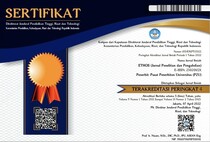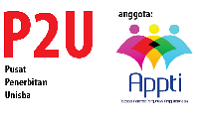PROSES BERPIKIR SISWA DALAM PEMECAHAN MASALAH BERDASARKAN COUNTING ON
Abstract
Keywords
Full Text:
PDF (Bahasa Indonesia)References
Arikunto, S. 2006. Prosedur Penelitian. Jakarta : Rineka cipta
Asna, Romiyati. 2010. Proses Berpikir Mahasiswa dalam Mengkonstruksi Bukti dengan Induksi Matematika di IAIN Mataram ditinjau dari Teori Pemrosesan Informasi. Tesis tidak diterbitkan. Malang: UM.
Baroody, A. J., Tiilikainen, S. H., & Tai, Y. C. (2006). The Application and Development of an Addition Goal Sketch. Cignition and Instruction, 24, 123-170. Doi: 10,1207/s1532690xci2401_3
Empson, Susan B, dkk. 2010. The Algebraic Nature of Fractions: Developing Relational Thinking in Elementary School. To appear in J. Cai & E. Knuth (Eds.), Early Algebraization: Cognitive, Curricular, and Instructional Perspectives. New York: Springer.
Farida, Nur. 2010. Proses Berpikir Kritis Mahasiswa melalui Perkuliahan Penyelesaian Masalah Program Linear. Tesis tidak diterbitkan. Malang: UM.
Fuson, K. C., & Fuson, A. M. (1992). Instruction Supporting Children’s Counting On for Addition and Counting Up for Subtraction. Journal for Research in Mathematics Education, 23, 72-78. doi:10.2307/749165
Hudojo, H. 2005. Kapita Selekta Pembelajaran Matematika. Malang: UM Press.
Lambert, M. A. (2008). Counting-On to Number: What Impact do Pedagogical Tasks Make? (Un-published master’s thesis). Purdue University, West Lafayette, IN.
Lompscher, J. (2002). The Category of Activity as a Principal Constituent of Cultural-Historical Psychology. In D. Robbins & A. Stetsenko (Eds.), Voices within Vygotsky’s non-classical psychology: Past, Present, future (pp. 79-99). Hauppauge, NY: Nova Science.
Meleong, L. J. 2010. Metodologi Penelitian Kualitatif. Bandung: PT. Remaja Rosdakarya.
National Council of Teachers of Mathematics. 2000. Principles and standards for school mathematics.- Reston, VA: Author
Olive, J. (1999). From Fractions to Rational Number of Arithmetic: A Reorganization Hypothesis. Mathematical Thinking and Learning, 1, 279-314. doi:10.1207/s15327833mt10104_2
Oleron, P., Piaget, J., Inhelder, B., & Greco, P. 1995. Intellectual operations and their development. In H. E. Gruber & J. J. Voneche (Eds.), The essential Piaget. Northvale, NJ: Jason Aronson.
Ron Tzur & Mattew Allen Lambert. 2011. Journal for Research in Mathematics Education, 42, 418-450
Siegler, R. S. (2000). The Rebirth of Chidren’s Learning. Child Development. 71, 26-35. Doi:10.1111//1467-8624.00115
Sokolova, E. E. (2002). The Relationship Between Vygotsky’s and Leont’ev’s Research Traditions as Revealed Through an Analysis of Leont’ev’s Early Work. In D. Robbins & A. Stetsenko (Eds), Voices within Vygotsky’s non-classical psychology: past, present, future (pp. 63-76). Hauppauge, NY: Nova Science.
Steffe, L. P. (2002). A New Hypothesis Concerning Children’s Fractional Knowledge. Journal of Mathematical Behavior, 20, 1-41.
Steffe, L. P.(2010). Articulation of the Reorganization Hypothesis. In L. P. Steffe & J. Olive (Eds.), Children’s Fractional Knowledge (pp.49-74). New York, NY: Springer.
Subanji. 2011. Teori Berpikir Pseudo Penalaran Kovarial. Malang: Universitas Negeri Malang.
Subanji. 2007. Metode Silih Tanya Berbantuan Kartu Media sebagai Alternatif Pembelajaran Inovatif dan Kreatif. Makalah disajikan dalam workshop Model-model Pembelajaran Matematika di SMA Negeri 1 Tuban. Tuban: 12 Juni.
Tzur, R., Simon, M. A. (2004). Distinguishing Two Stages of Mathematics Conceptual Learning. International Journal of Science and Mathematics Education, 2, 287-304. Doi:10.1007/s10763-004-7479-4
Woolfolk, Anita. 2009. Educational Psychology Active Learning Edition. Edisi Kesepuluh. Pustaka Pelajar. Yogyakarta.
DOI: https://doi.org/10.29313/ethos.v0i0.1669
Refbacks
- There are currently no refbacks.
Alamat Redaksi:
LPPM Unisba, Lantai 2, Jl. Purnawarman 63, Bandung 40116, Jawa Barat, (022) 4203368 , (022) 4264064. ethos.unisba@gmail.com / ethos@unisba.ac.id

This work is licensed under a Creative Commons Attribution-NonCommercial-ShareAlike 4.0 International License.














